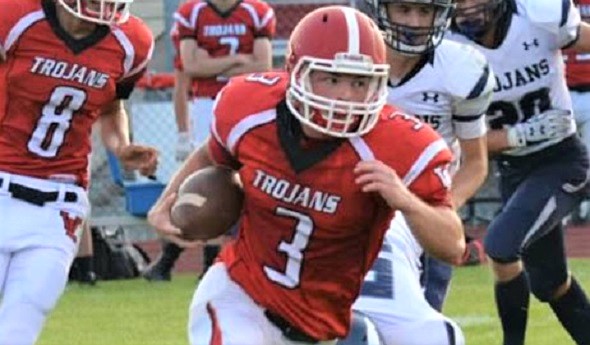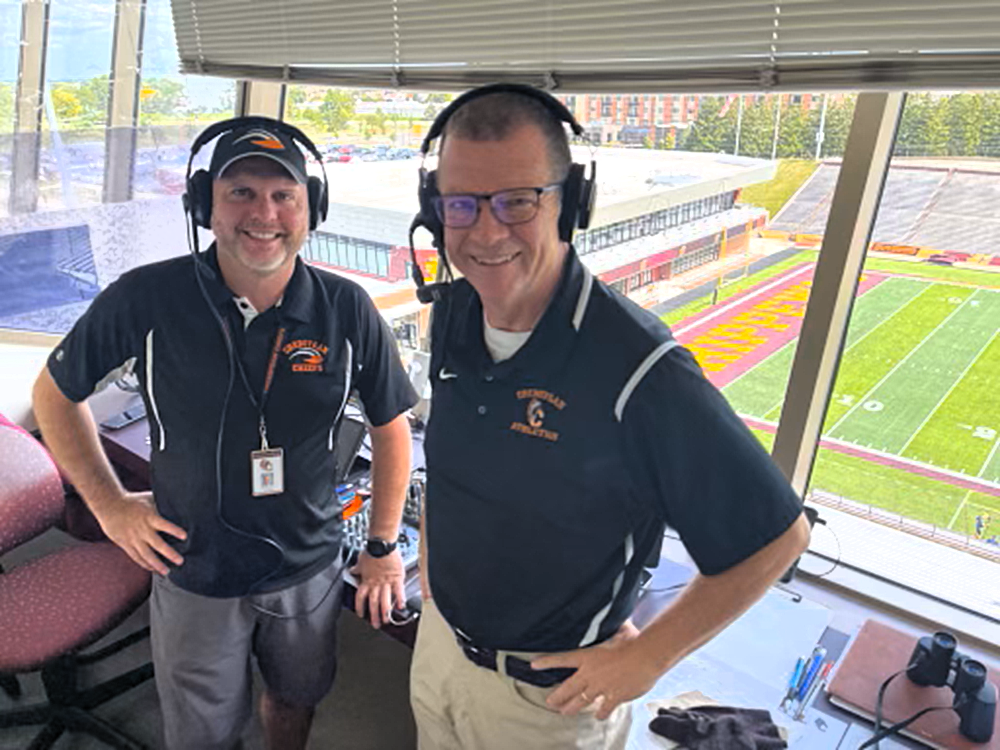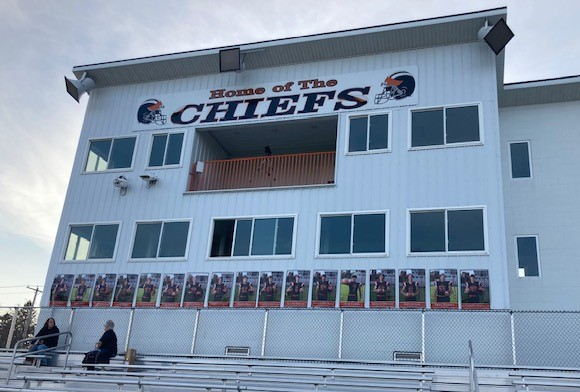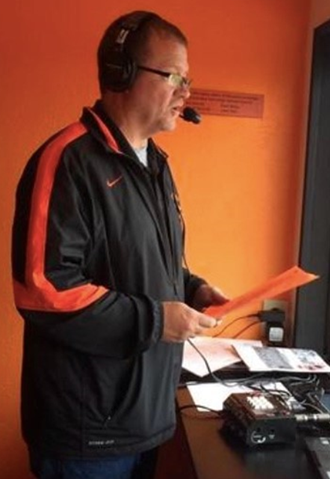
'Unknown' Suits Whitmore Lake Well
October 11, 2019
By Doug Donnelly
Special for Second Half
WHITMORE LAKE – The move to a new athletic conference has put some renewed energy into the Whitmore Lake football team and has the Trojans thinking playoffs for the first time in years.
 Whitmore Lake, a Class C school on the northern edge of Washtenaw County, moved to the Michigan Independent Athletic Conference this season after 46 years in the Tri-County Conference. It was a big move for the school, which hoped to inject some enthusiasm into its student-athletes, including a football program that was lagging in numbers and had made the playoffs just once during the last decade.
Whitmore Lake, a Class C school on the northern edge of Washtenaw County, moved to the Michigan Independent Athletic Conference this season after 46 years in the Tri-County Conference. It was a big move for the school, which hoped to inject some enthusiasm into its student-athletes, including a football program that was lagging in numbers and had made the playoffs just once during the last decade.
“I feel pretty good about the buzz and excitement that is going on,” said fourth-year Whitmore Lake head coach Brian Boron. “There’s definitely a resurgence with a lot of new things.”
Four-year starting offensive tackle Alex Williams noticed the change soon after Whitmore Lake announced the move from the TCC to the MIAC after last football season.
“I feel like interest in football picked up a lot more,” said Williams. “Being a captain, you see it in school. The eighth graders will come up to you and talk about football. We had more people in our weight room all winter. The culture has definitely changed.”
The first year in a new conference has brought all sorts of new experiences to the football team, both for players, coaches and fans.
“Do we miss the TCC? Absolutely. We were one of the founding teams,” Boron said. “We miss being part of that history and tradition.
“From a win-loss standpoint, things are going well. But this year I also have 12 seniors on the team, by far the most of any team I’ve had in my four years here. Are we competitive more because of that, or because of the new league? I don’t know.”
Whitmore Lake beat Auburn Hills Oakland Christian 62-33 last Friday to improve to 4-2 on the season. Its only losses were nonleague games to undefeated and state-ranked Royal Oak Shrine Catholic and Ann Arbor Father Gabriel Richard. Against Shrine, the Trojans fumbled three times; and against Richard, Whitmore Lake thought it had tied the game late in the contest, but a 2-point conversion was called back and the Trojans didn’t convert on the next attempt.
Several teams on Whitmore Lake’s schedule are first-time opponents, including Sterling Heights Parkway Christian, Auburn Hills Oakland Christian and Friday’s opponent, Southfield Christian.
Senior running back Evan Romeo, a 1,000-yard rusher as a sophomore, is enjoying a big senior season as well.
“Evan is having a great year,” Boron said. “Last year he missed five games with a hamstring pull.”
Logan Kurth, Cole Henning and Evan Vaughn are other backfield mates, and the quarterback is Zach Brady.
“He doesn’t get a lot of credit, but he’s the architect of the whole thing,” Boron said of Brady. “He makes it go. Every game we have a referee or member of the chain gang come tell us that they can’t find the ball because Zach is doing such a great job with his fakes.”
Whitmore Lake’s biggest win this season came against Oakland Christian, which came into the game 4-1. The Trojans appear to be on a league title-deciding collision course with Week 9 opponent Livonia Clarenceville, also undefeated in the MIAC. Whitmore Lake’s last league championship in football came in 2002.
“In this league, we are playing against teams with 18 or 19 kids on the varsity, just like us,” Boron said. “When I took the program over, we had maybe 17 kids in the entire program. They aren’t great numbers, but now we are closer to 30. I’m hoping to add more.”
In making the move last fall, Whitmore Lake Superintendent Tom DeKeyser said it had become apparent that, at least in some sports, the Trojans were not competing at the same level as other TCC schools.
“We have built a lot of great relationships in the TCC,” DeKeyser said. “But our coaches and athletes are excited to try something different.”
Everyone in Trojans camp hopes that “different” translates into more student-athletes.
“We had 10 or 12 freshmen come out this year, some who had never played football before,” Boron said. “That’s been a good thing. We’re not sure about next year, how many kids we’ll get up from our youth program. We’ll have to see. The team having success, I believe, will help that.”
One thing Boron has found is that the move is demanding on the coaching staff, which has a whole new set of opponents for which to prepare. It used to be one or two new teams would join the schedule. This year, nearly all of the Trojans’ opponents are new.
“No other team in our league runs the ‘T’ which means we don’t see how anyone is going to defend it on film,” Boron said. “We kind of rep everything because we don’t know how they are going to line up against us. We’re still getting a feel for these other teams. It’s fun. As coaches, we watch a lot of film. We have to be able to adjust and be ready for just about anything.”
The Trojans already have scored more points than any team it has fielded since 2008, which is the last time Whitmore Lake finished with a winning record. The 2013 team made the playoffs but finished 5-5 after a first-round loss. That 2008 season capped the greatest football era in school history, when Whitmore Lake made the playoffs seven times during an eight-year span.
Boron isn’t making predictions for Whitmore Lake’s future just yet. There are still a lot of unknowns.
“Everybody is still trying to figure things out,” he said. “We will sometimes get to a school a half-hour or 45 minutes early because we are unsure of the traffic patterns still. Teams get to our school way early some weeks for the same reason.
“I think it’s a good thing for the future of football at Whitmore Lake. The unknown is exciting.”
 Doug Donnelly has served as a sports and news reporter and city editor over 25 years, writing for the Daily Chief-Union in Upper Sandusky, Ohio from 1992-1995, the Monroe Evening News from 1995-2012 and the Adrian Daily Telegram since 2013. He's also written a book on high school basketball in Monroe County and compiles record books for various schools in southeast Michigan. E-mail him at [email protected] with story ideas for Jackson, Washtenaw, Hillsdale, Lenawee and Monroe counties.
Doug Donnelly has served as a sports and news reporter and city editor over 25 years, writing for the Daily Chief-Union in Upper Sandusky, Ohio from 1992-1995, the Monroe Evening News from 1995-2012 and the Adrian Daily Telegram since 2013. He's also written a book on high school basketball in Monroe County and compiles record books for various schools in southeast Michigan. E-mail him at [email protected] with story ideas for Jackson, Washtenaw, Hillsdale, Lenawee and Monroe counties.
PHOTO: Whitmore Lake now-senior running back Evan Romeo breaks into the open. (Photo courtesy of the Whitmore Lake football program.)

Grisdale to be Honored for 40 Seasons on Call for Cheboygan Football
By
Tom Spencer
Special for MHSAA.com
September 13, 2024
When Jason Friday was in high school, there were two types of football fans in Cheboygan.
 Folks either went to watch the Cheboygan Chiefs play under the lights, or they listened to the game on the radio called by play-by-play announcer Mike Grisdale.
Folks either went to watch the Cheboygan Chiefs play under the lights, or they listened to the game on the radio called by play-by-play announcer Mike Grisdale.
Well, not much has changed. Friday, a 1992 Cheboygan grad, is now the school’s athletic director. And Grisdale is in the middle of his 40th season on the air.
What is changing tonight, though, is Cheboygan will officially dedicate the stadium press box to Grisdale in a special pregame ceremony before the Chiefs (1-1) take on Elk Rapids (1-1).
Former Cheboygan coaches, Grisdale’s family and people who have worked with him on the radio over the years will be on hand for the ceremony.
“We were able to get Dan Miller, George Blaha, Ken Kal and Dan Dickerson — radio broadcasters for all four Detroit sports — to record statements that we will play over the public address system,” said Friday. “Mike will be presented a smaller version of the plaque that we will be hanging in the press box, and he will have a chance to talk.”
Naming the press box after Grisdale has been in the works for more than a year, Friday noted. Grisdale first learned of the plan when he was interviewing Friday during halftime of a football game last year.
“Jason surprised me on the air,” Grisdale recalled. “I was shocked, but honored and thankful.”
 Grisdale, a 1979 Cheboygan grad, is humbled noting there are so many people who contribute to the radio broadcasts and football program. He remembers listening with his father to Jorden James and Bob Martin call Chiefs games when some of the older kids from the neighborhood were playing high school football.
Grisdale, a 1979 Cheboygan grad, is humbled noting there are so many people who contribute to the radio broadcasts and football program. He remembers listening with his father to Jorden James and Bob Martin call Chiefs games when some of the older kids from the neighborhood were playing high school football.
“I have just been so fortunate to do it for this long and have become the go-to guy for historical information and perspective,” Grisdale said.
Grisdale, who has also done nearly 1,000 Chiefs basketball games on the air, along with some hockey and soccer, said his interest in sports goes back to his childhood.
Grisdale grew up in Cheboygan with three brothers in a neighborhood full of kids. Sports were a big part of their lives — collecting baseball cards, listening to the Detroit Tigers on the radio, and playing basketball, kickball and wiffle ball.
Grisdale, who also hosts a Saturday morning radio show from a local restaurant called “Coaches Corner,” vividly recalls trying to keep a scorebook while listening to high school basketball games on WCBY radio and dreaming of becoming the next Blaha, or Ernie Harrell, Bob Ufer, or Bruce Martin - four legendary broadcasters of Michigan professional and college sports.
While at Central Michigan University earning a broadcasting degree, Grisdale got extensive of on-air experience on student stations. He worked on Cheboygan radio stations during summers.
Some of his fondest memories of Chiefs broadcasts have come from the locations where they’ve played.
“I have enjoyed having the opportunity to cover games at places like the Pontiac Silverdome, Palace of Auburn Hills, Crisler Arena and the Breslin Center,” Grisdale said. “You remember the exciting moments and big games”
 The 40 years on the air, along with earlier turns covering Marshall and Albion football and basketball games, are really just a blur to the highly-revered radio personality.
The 40 years on the air, along with earlier turns covering Marshall and Albion football and basketball games, are really just a blur to the highly-revered radio personality.
“The seasons just seemed to run together,” Grisdale said. “There were many, many times when the weather and the long road trips took their toll.”
Grisdale played football at Cheboygan High School and was an offensive end and a defensive safety on a 9-0 squad his senior year in 1978. He caught three touchdown passes that season. He also held for extra points, collecting snaps from his brother Mark, the Chiefs’ long-snapper.
Mike Grisdale doesn’t hesitate to point out the best player he covered was fullback Shannon Scarborough from the 1991 team that reached the Silverdome – “The all-stater was strong and fast and played both ways,” he noted. But Grisdale has loved all the players and teams over the years. “I do it because I enjoy promoting the kids, keeping the traditions alive, seeing the community come together, good sportsmanship, and being part of a team.”
Friday, who also has broadcast multiple games alongside Grisdale over the years, has enjoyed Grisdale’s efforts to promote every player.
“Kids always love to hear their name on the radio,” Friday said. “What I think he does better than anyone is to make sure the offensive and defensive linemen are consistently mentioned — those boys in the trenches often get overlooked, but not with Mike on the call.”
When Cheboygan installed NFHS Network cameras, the athletic department sought to successfully connect Grisdale’s radio broadcast through the video feed.
“That has been a huge bonus and something that many community members have told me they appreciate,” Friday said.
Grisdale, who also works part-time for Black Diamond Broadcasting in its Cheboygan studios and serves Mackinaw Health System based in St. Ignace as its marketing director, has no plans to end his broadcasting career.
“As long as our local radio station can keep the tradition alive and I am still around, it would be my privilege to keep it going,” Grisdale said.
Cheboygan High School games are carried on WCBY (Cheboygan) 1240 AM, 100.7 FM and 98.1 FM, and streaming at BigCountryGold.com.
 Tom Spencer is a longtime MHSAA-registered basketball and soccer official, and former softball and baseball official, and he also has coached in the northern Lower Peninsula area. He previously has written for the Saginaw News, Bay County Sports Page and Midland Daily News. He can be reached at [email protected] with story ideas for Manistee, Wexford, Missaukee, Roscommon, Ogemaw, Iosco, Alcona, Oscoda, Crawford, Kalkaska, Grand Traverse, Benzie, Leelanau, Antrim, Otsego, Montmorency, Alpena, Presque Isle, Cheboygan, Charlevoix and Emmet counties.
Tom Spencer is a longtime MHSAA-registered basketball and soccer official, and former softball and baseball official, and he also has coached in the northern Lower Peninsula area. He previously has written for the Saginaw News, Bay County Sports Page and Midland Daily News. He can be reached at [email protected] with story ideas for Manistee, Wexford, Missaukee, Roscommon, Ogemaw, Iosco, Alcona, Oscoda, Crawford, Kalkaska, Grand Traverse, Benzie, Leelanau, Antrim, Otsego, Montmorency, Alpena, Presque Isle, Cheboygan, Charlevoix and Emmet counties.
PHOTOS (Top) Mike Grisdale, right, and partner Nate King broadcast a Cheboygan game from Central Michigan University. (Middle) The Cheboygan stadium press box will be dedicated to the longtime broadcaster. (Below) Grisdale is on the call for another Chiefs game. (Photos provided by Grisdale and the Cheboygan athletic department.)

